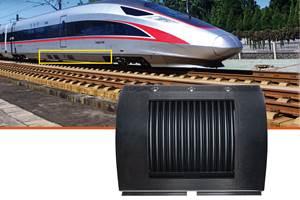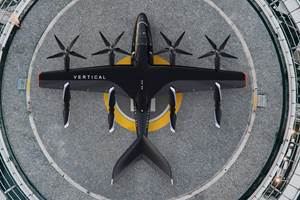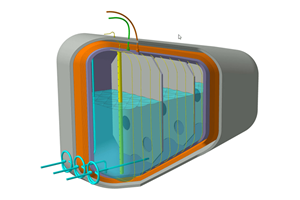Beta Technologies raises $300 million to fund AAM growth, commercialization
Series C capital raise will be used to propel the certification of Beta’s composites-intensive Alia CTOL, Alia VTOL and electric motors, while directly supporting ramp-up of production, delivery of aircraft and chargers.
Beta Technologies Inc. (Burlington, Vt., U.S.) has raised $318 million in Series C equity capital. Qia led the raise and several of Beta’s largest investors, including Fidelity Management & Research Co. and TPG Rise Climate, increased ownership in Beta. Longtime customer United Therapeutics has also joined this round as an investor. The financing round was priced at an increased valuation relative to prior equity capital raises and was meaningfully oversubscribed. To date, Beta has raised more than $1 billion in equity capital.
Over the past 8 years, Beta has developed sustainable products to lower the cost of transporting goods and people safely and reliably. This new funding will support the continued production, certification and commercialization of those solutions, which include Beta’s all-electric fixed-wing and electric vertical takeoff and landing (eVTOL) aircraft, Alia, high-performance electric propulsion systems, as well as its multimodal charging systems and growing infrastructure network. “This investment validates progress and milestones toward commercializing electric aviation,” said Kyle Clark, Beta’s founder and CEO.
Beta’s all-electric aircraft, which are optimized for payload and range, sit at the center of its vision to make air transportation more reliable, greener and cheaper. Beta is certifying two variants with the Federal Aviation Administration (FAA): the Alia CTOL (which uses a runway to take off and land conventionally) and the Alia VTOL (which is runway independent as it takes off and lands vertically). These aircraft share structural similarities, and both leverage Beta’s electric propulsion technologies and fly-by-wire flight control systems. The company plans to certify cargo and passenger configurations of both aircraft, which suits commercial and military customers.
In addition to aircraft, Beta has designed, certified and is manufacturing multimodal charging systems for its aircraft and industry peers’, as well as ground eletric vehicles (EVs) of all types. Beta’s UL-certified grid-tied charging systems for aircraft are being adopted by multiple customers including several other aircraft manufacturers, and the company is selling charging systems as well as building a network of charging systems at airports across the U.S. To date, Beta has completed installation of its infrastructure across the eastern and southern U.S., and plans to connect the network across the U.S. and expand globally in coming years.
In late 2023, Beta opened up a nearly 200,000-square-foot manufacturing facility, where the team is currently producing aircraft for delivery to customers — the facility has capacity to produce up to 300 aircraft per year, which the business will continue to increase over the following 18-24 months — and charging cubes for deployment to the network. As they come off the line, these aircraft will begin to fulfill Beta’s deposit-backed contracts with global operators including Air New Zealand, UPS, United Therapeutics, Blade Urban Air Mobility, Bristow, Helijet, LCI, the U.S. Air Force and the U.S. Army.
Beta notes that it has been flying its aircraft and charging on its own infrastructure for more than four years, operating in the busiest U.S. airspace, crossing international borders and completing deployments with the U.S. Department of Defense. The company has demonstrated reliability, cost reductions compared to fuel-based aircraft and achieved milestones such as crewed transition of a production-intent eVTOL.
The company’s approach to commercialization includes owning and controlling the key enabling technologies for electric aviation — such as the electric motor, inverter, battery packs, high voltage distribution and safety-critical flight controllers — and partnering with best-in-class and legacy aerospace suppliers on other components where it has proven strategic to do so. This approach has optimized production timelines, clarified certification pathways, and diversified revenue streams within Beta’s business.
As it boosts production and certification efforts, Beta says it will continue working closely with its customers to ensure the delivery of a robust pilot and maintenance training program, and aftermarket support systems.
Related Content
Composite sidewall cover expands options for fire-safe rail components
R&D project by CG Rail explores use of carbon fiber-reinforced thermoplastics and recycled manufacturing scrap to meet fire safety, weight and volume targets.
Read MoreVertical Aerospace eVTOL prototype goes down during uncrewed test flight
The U.K. company has confirmed the Aug. 9 accident that resulted in significant aircraft damage and potential setbacks.
Read MoreHonda begins production of 2025 CR-V e:FCEV with Type 4 hydrogen tanks in U.S.
Model includes new technologies produced at Performance Manufacturing Center (PMC) in Marysville, Ohio, which is part of Honda hydrogen business strategy that includes Class 8 trucks.
Read MoreCollins Aerospace to lead COCOLIH2T project
Project for thermoplastic composite liquid hydrogen tanks aims for two demonstrators and TRL 4 by 2025.
Read MoreRead Next
AIR presents cargo-focused eVTOL aircraft
AIR’s eVTOL offerings now include an unmanned variation of AIR One for cargo and logistics use, featuring its agile design across different use cases.
Read MoreMidnight eVTOL surpasses 400 test flights ahead of schedule
Over the last 8 months, Archer Aviation has completed a total of 402 test flights with its composites-intensive aircraft, adding to key milestones.
Read MoreCAEATFA grants Archer approval for electric powertrain facility ramp-up
The $117 million award, believed to be CAEATFA’s largest to date in AAM, will support Archer’s planned expansion of battery pack and aircraft production facilities intended to support eVTOL commercialization.
Read More




























